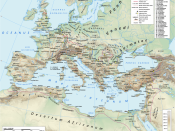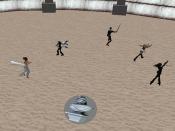A prodigious dragon, a loathsome three-foot king and a talking donkey that surpasses the tolerable level that one should be exposed to, recapitulates the journey Shrek took that changed the lives of an entire society. As an indirect effect, Shrek came to show that a single individual could overturn the authority of an empire. On a similar note, Spartacus, best known for his slave rebellion against the Romans, also changed the face of an empire by reversing the stratified structure and placing power into the hands of slaves. Although Spartacus did not have to conquer prodigious dragons or a loathsome three-foot king, his ability to eradicate the bonds of calamitous oppression in a society striped of authority can only inspire admiration.
The Roman Empire, during the conquest of the Mediterranean, became extremely dependant on the use of slaves because of its haphazard expansionistic policy that obtained a vast amount of territory.
To this day the total number of slaves in the Roman Empire is difficult to judge; estimates vary from two to four free men to every slave. (Spielvogel, pg.9) Slavery exemplified the inhumane violence at the heart of Rome's imperial system and slave resistance showed that Roman law and imperial authority did not go unchallenged. (Shaw, preface) Among all the slaves stood one man "that was a champion of the masses and leader of the one genuine social revolution in Roman history." (Gruen, pg 20-21)
Spartacus, who was born in Thrace, was believed to have been an auxiliary in the Roman army in Macedonia. When he deserted the army he was outlawed, captured and sold into slavery to a trainer of gladiators at Capua. Spartacus was taken prisoner while he was in the Roman army and then sold into slavery in the Roman world; there is...


